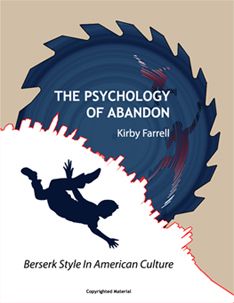
Freudian Psychology
Ambivalence and the Decision Tree
Two deep models shaping your behavior whether you know it or not
Posted August 24, 2012
If you're ambivalent, you have conflicting or even opposite feelings. It sounds simple enough, but it's not so easy to appreciate how it shapes your life. Ambivalence can be paralyzing, exasperating, or intimidating when you have to admit that we're of two minds (at least) about everything.
The idea began to intrigue me when I found to my amazement that most (smart) college students I asked were unable to define ambivalence. They confused it with ambiguity and equivocation. The concept that we have conflicted feelings and attitudes about everything seemed strange to them, or only hazily familiar. For a decade now I've kept asking the question, always with the same result, even with a small sample of international students. This is really crucial, rock-bottom-important stuff. They sort of know they have complicated inner life, but they're fuzzy about the word—the concept—that would give them some control over it. What's going on here?
Here's a hypothesis:
A generation or two ago most college students knew something about slide rules and Freudian lingo. Thinking about inner life, you used terms like repression and ambivalence—sometimes clumsily, but that's another story. Freud, you recall, saw personality beset by conflicting forces. The challenge was to face up to the storm of reality and keep your balance. For Freud, you were a detective of inner life trying to identify the often invisible pressures pushing you off the sidewalk. It was all about keeping an eye on the shadows and continual problem-solving. It was all process, with no trophy answers and lifetime guarantees. And it was a moral drama too. It prodded you to admire courage and honesty and the ability to harmonize tensions—what the Victorians used to call character.
The Freudian heyday was the hair-raising twentieth century with its insane industrial killing, sickening Depressions, and social revolutions smoked down to a roach that burned your fingers. Adversity could knock you off your bicycle, but so could swinish affluence.
Now a generation has grown up in the post-Vietnam age of computers and consumer utopia. The deep trope underlying inner life now is no longer Freud's vision of wrestling with ambivalence every day, but the decision tree. Life is a sequence of consumer choices. Yes, no. This one or that. The underlying scheme directs you to pick the right schools, the right career, the right spouse, the right neighborhood, the right child, the right pediatrician, the right schools, the right grief counselor. If you get each branch of the decision tree right, you collect $200 and reach utopia as in a board game. Or you best every enemy in sight and rest your tired thumbs in video game triumph. The model implies that utopia means success, prestige, perfect contentment, a framed ownership certificate, envious eyes on your awesome wardrobe, your McMansion, and your leased BMW.
Decision tree behavior is easy to caricature because you and I know that in reality it's artificial.1 It fits a culture saturated in airbrushed commercialism in which political candidates can be caught lying repeatedly yet trusted for their wealth and lifestyle. Decision tree thinking asks if you made successful choices invading another country, not what motives were pulling the trigger or who suffered along the way. It turns denial into a plastic sterling silver trophy cup on the mantel. Since it doesn't honor the sweaty effort to balance conflicted motives, it values more: more success, more money, more more. Hence the nation's catastrophic financial bubbles and unending piggybank-busting wars.
The decision tree also serves a culture that privileges executive freedom and enforces factory controls. After all, it's industry that raised living standards by systematizing work in scale. The boss and the timeclock rule working lives. The decision pretends that you, too, can escape that crushing monotony and take home an obscene Wall Street salary if only you choose right at every juncture.
Described this way, the model arouses your ambivalence, doesn't it? It's attractive simplicity may even set your teeth on edge. Actually you've been ambivalent all along, but American culture smothers ambivalence under the couch pillows. Unless you're an idiot or a ranting talkshow ideologue, real life mixes up the two models. These days ambivalence is harder to deal with partly because Freud & co. are out of fashion and so many successful people seem to be telling you that decision trees are as infallible as tech. But like Microsoft Word, choice isn't what it's cracked up to be.
The truth is, ambivalence is everywhere and worth knowing about. For instance, you're telling somebody what you really want to get done today, and you sit there earnestly elaborating the details, over and over and over, until your friend finally gets up saying, "Well, I shouldn't keep you," pulling the ambivalence alarm to get you moving.
You want to be an ichthyologist or a pet store owner, but it will close off the thousand other careers you've dreamed of. You love intimacy, but you resent its demands too. You enjoy sex but there are times when part of your brain is echoing Lord Chesterfield's harumpf that "the sensation's only momentary, and the positions are ridiculous." When hormones are boogeying, you nearly faint at the sight of a beautiful body. Yet bodies are also hilariously grotesque, with a big toe on one end, a bony pod of thinking meat on the other, and in the middle, teeth, thirty feet of plumbing, wrinkles, erratic hair, and assorted orifices. You love your body. It feels sexy and promises to generate more life at those times when you forget that you're also trapped in it and if you stick around long enough, it will decay and die and take you with it.
The mind-blowing paradox is that ambivalence generates anxiety, and as Ernest Becker saw, anxiety spurs us to create culture as our primary means of managing those deepest of creaturely conflicts. No wonder the bipeds are continually renovating houses, religions, and scientific theories. No wonder we're tirelessly reinventing the cultures that shelter and inspire us and make us believe our lives have enduring significance. We love them. We fear and hate them. We scrutinize and recreate them.
But that's a betel nut to chew another day.
1. The best caricature of decision-tree thinking I know is in one of the most profound American novels ever published, John Barth's devastatingly tragicomic The End of the Road (1958). Not to be missed.
-----------------

As a cultural style, berserk abandon is terrifying yet also alluring. It promises access to extraordinary resources by overthrowing inhibitions. Berserk style has shaped many areas of contemporary American culture, from warfare to politics and intimate life. Focusing on post-Vietnam America and using perspectives from psychology, anthropology, and physiology, Farrell demonstrates the need to unpack the confusions in language and cultural fantasy that drive the nation’s fascination with berserk style.
<<This book amazes me with its audacity, its clarity, and its scope. We usually think of ‘berserk’ behaviors—from apocalyptic rampage killings to ecstatic revels like Burning Man—as extremes of experience, outside ordinary lives. in fascinating detail, Farrell shows how contemporary culture has reframed many varieties of abandon into self-conscious strategies of sense-making and control.
Abandon has become a common lens for organizing modern experience and an often troubling resource for mobilizing and rationalizing cultural and political action.This landmark analysis both enlightens and empowers us.>>
—Les Gasser, Professor of Information and Computer Science, U. of Illinois, Urbana-Champaigne.



